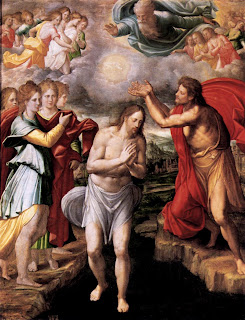We
celebrate the feast of Pentecost, 50 days after Easter.
Feast of the Holy
Spirit
and the "beginning" of the mission of the Church.
Acts 2:1-11: all were filled with the Holy Spirit and began to speak
Psalm 103: Send forth your Spirit, and renew the face of the earth
1 Cor 12:3 b- 7.12 -13:
We have been baptized in one Spirit into one body
Jn 20:19-23: Receive the Holy Spirit
In his
book of Acts, Luke tries to explain why the disciples, like Jesus Christ, have
the power to do the wonders they do. Luke uses the "feast of weeks"
of ancient Israel that celebrates the
commemoration of the arrival of the people to Mount Sinai where Yahweh gave the
tables of the Law to Moses in the middle of thunder and lightning. Both, the
symbolic elements of Sinai and of Pentecost are symbols of cosmic resonance that
manifest God's intervention.
In his
letter to the Corinthians, Paul highlights the work of the Spirit in the lives
of believers and in the construction of the ecclesial community. The Spirit links
the mission of the Church to the mission of Jesus. Paul knows of the divisions
within this community, that is why he insists that gifts, charisms, ministries
and services come from the same Spirit.
He says
that all the charisms, gifts and ministries are given for the growth of the
Church. The action of the Spirit makes the mission of the Church a Mission for
the world and not just for individual
sanctification.
John
presents two contrasting scenes. 1) The disciples at dusk, locked in a house
full of fear. 2) Jesus entering, communicates to them peace and shows his
wounds as a sign of his real presence. This fills
them with joy and gives them the Spirit who makes them ready for Mission. Jesus
transforms his fear, darkness, isolation and confinement into: peace, joy and a missionary
spirit. The mysterious and transforming action of the Spirit within the
believer and in the community makes the resurrection, ascension, eruption of the Spirit and ecclesial mission are a closely
and articulated action. They are not isolated but simultaneous, progressive and
facilitating moments within the community of believers.

Jesus
promised his disciples that he will soon return, that He will never leave them
alone; and he fulfills it! He said that the Holy Spirit of God will assist them
to make them understand everything he told them; and that happens! By blowing
on them as God breathed to create the human being, Jesus tells them that the
Spirit creates and makes everything new. They are the new people of the creation
restored by the loving self-giving of Jesus.
- With
the advent of the Holy Spirit in human history begins a new way to experience
God´s presence.
-
Pentecost is the beginning of the final stage in the history of salvation.
- it is the starting point of the preaching of the
gospel by the Apostolic Church.
- The
Spirit pushes the Church beyond geographical, social and cultural boundaries,
everyone understands the message in their own language. All countries known
until then indicate that the Gospel message is universal.
- The
Spirit comes in community, when the disciples are gathered, and his
announcement opened a new community.
Sometimes,
violence, injustice, poverty and corruption of society fill us with despair,
fear and discouragement. We see no outputs and we lock ourselves in our
individual issues and forget the big issue that is Jesus. Then, suddenly, he
breaks into our interior, pierces the doors of our heart and enlightens our
understanding, helping us to realize that He has not abandoned us, He is still
present in the believer's life, in the community and in the world.
We
recognize Him and His Spirit acting in many people and organizations who fight
against all forms of sin that dehumanize and alienate us. The Spirit of God keeps
acting in our history even when we do not perceive it
, He does it silently and often we do not feel Him because He acts in a simple
way through gestures that may go unnoticed. The daily rush and worries prevent us from hearing and recognizing
Him. We must make space for a deeper prayer time, trying to hear the motions
that the Spirit inspires in me, in my community and the world, in the
commitment of love, in the care for the poor.
PRAYER
Beautiful
God, elusive Spirit, Light of all lights, love ever present in all love,
Life and
Force who blows on all creation:
empty
Yourself out, again, today,
on all creation and all peoples,
so that
in beyond the different names
that we use to invoke
You,
we may find
you, and we could meet each other
in You, united in our love
for all that
exists.
You who
live and make live, everything,
for ever and ever.
 Three figures make up the nativity scene in Bethlehem – the Holy Family of Jesus, Mary and Joseph. Their first visitors were the three wise men. Later, in the desert preparing to begin his public life, Jesus was tempted three times by the devil. A good story should have a beginning, a middle and an end. Christ was a storyteller par excellence and three figures prominently in his parables. The Prodigal Son is about a father and his two sons; the Good Samaritan tells of the behaviour of three passers-by, the priest, the Levite and the Samaritan; the sower sowed his seed in three different types of terrain, yielding three different levels of harvest.
Three figures make up the nativity scene in Bethlehem – the Holy Family of Jesus, Mary and Joseph. Their first visitors were the three wise men. Later, in the desert preparing to begin his public life, Jesus was tempted three times by the devil. A good story should have a beginning, a middle and an end. Christ was a storyteller par excellence and three figures prominently in his parables. The Prodigal Son is about a father and his two sons; the Good Samaritan tells of the behaviour of three passers-by, the priest, the Levite and the Samaritan; the sower sowed his seed in three different types of terrain, yielding three different levels of harvest.  The end of his life, as the beginning, has again the three motif. During his Passion, Peter denied him thrice. On the road to Calvary, he fell three times. The crucifixion scene has three figures, Christ between two thieves. Before his resurrection, he spent three days in the tomb.
The end of his life, as the beginning, has again the three motif. During his Passion, Peter denied him thrice. On the road to Calvary, he fell three times. The crucifixion scene has three figures, Christ between two thieves. Before his resurrection, he spent three days in the tomb.


















